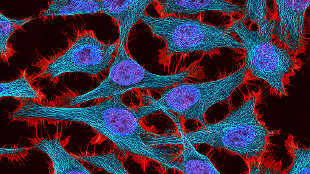 WIKIMEDIA, NIH
WIKIMEDIA, NIH
Beginning May 1, Nature and its associated journals will expand an existing policy to ask authors to check the identity of the cell lines used in their manuscripts against a publicly available list of more than 400 lines that have been shown to be misidentified or contaminated, according to an editorial published last week (April 15).
Authentication of cell lines in recent years has revealed “pig” cells that were actually from chickens and human cells that contained hamster, rat, mouse, or monkey materials. To combat potentially inaccurate results arising from using such mislabeled and contaminated cell lines in research, Nature journals in 2013 requested that authors state where the cells used in submitted work were obtained. However, a recent sampling of 60 papers published in ...






















